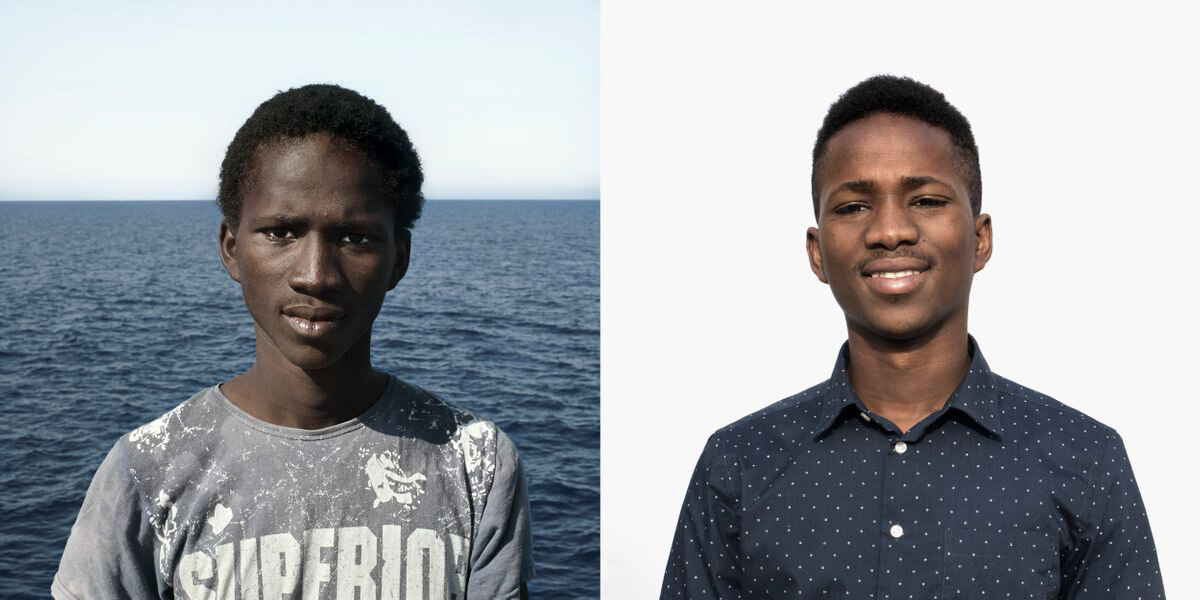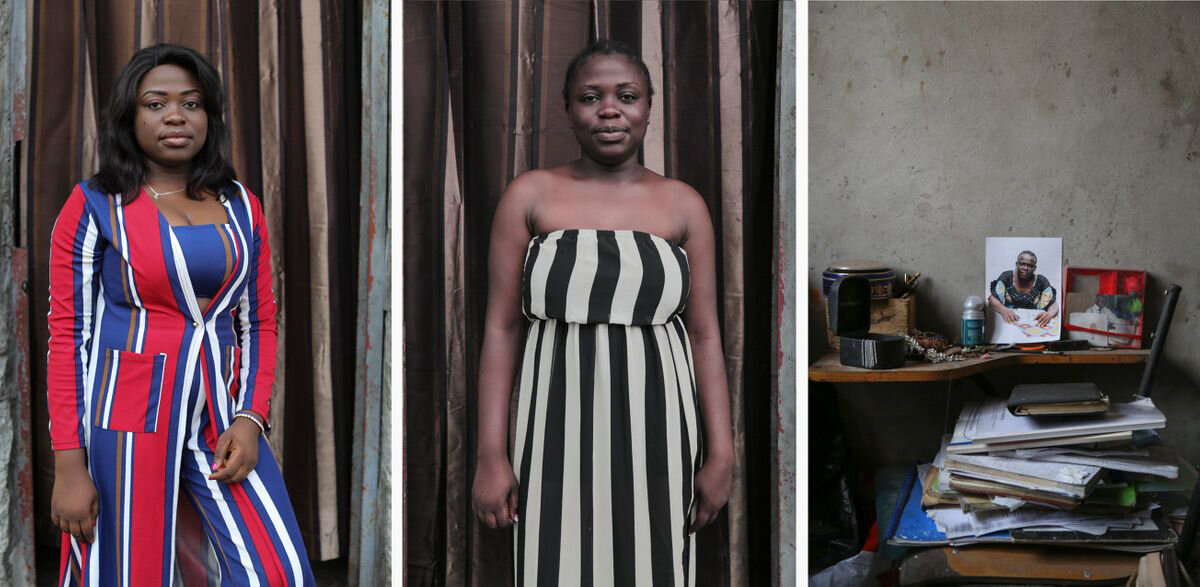CAP Prize 2020 | Winners
AND THE WINNERS OF THE CAP PRIZE 2020 ARE…
The five winners were selected by the CAP Prize panel of judges, comprising 18 international curators, editors, publishers, and artists, from hundreds of applications for the CAP Prize 2019.
Cesar Dezfuli
Born in 1991 in Madrid, Spain. Lives in Madrid, Spain
www.cesardezfuli.com | Instagram: @dezfuli |Twitter: @dezfuli
Passengers, 2020
The ‘Passengers’ project seeks to put a face to those who have seen the need to migrate outside the system, analyzing the impact that this movement has on their identity.
On August 1, 2016, 118 people were rescued from a rubber boat drifting in the Mediterranean, 20 nautical miles off the Libyan coast. It’s one of the hundreds of boats that have been rescued from this migratory route in the past years. Only in 2016 were historical records were beaten as 181,436 migrants were rescued safe, while 4,576 died at sea.
In an attempt to put a name and face to this reality, I portrayed the 118 people who traveled on the same boat a few minutes after their rescue. Their faces, their looks, the marks on their body, their clothes, or the absence of them reflect the mood and physical state in which they were in after a long journey that had marked their lives forever.
But that would be just the beginning of this investigative project.
I soon understood that these people I had portrayed lacked real identity. They were not themselves, but they were a result of a long journey during which their identity had been diluted in the mass, sometimes hidden by themselves for fear of the environment, stolen based on abuses and humiliations. This shows that the price of traveling outside the system is too high, especially for those who pay with their lives.
During the last three years, I have worked to locate the 118 passengers, today scattered throughout Europe, to understand and document their real identity, to show that in those individuals who I had photographed in 2016, there were latent identities, which only needed a peaceful context to flourish again.
To date, I have met 63 of them, and I have located 105. They currently live in various cities in Italy, Germany, France, Spain, Belgium, Malta, Holland, and Switzerland. And, although their future is still uncertain, at least they have been able to return to being themselves.
Rahima Gambo
Born in 1986 in London, United Kingdom. Lives in Abuja, Nigeria
www.rahimagambo.com | Instagram: @rahrahhima
Tatsuniya, 2019
Lately, I’ve been thinking about filmmaker Trinh Minh-Ha’s phrase “speaking nearby” as a way to describe the visual approach of the ‘Tatsuniya’ series. The intent wasn’t to directly approach my subject to extract usable information or to affirm a position in a traditional way, but rather to turn curiosities to the things that happen around the making of these images.
The bonds and frictions between my subjects and I, the mistakes and throw away gestures made when the camera keeps recording, the invisible things learned and encountered that make no sense at that moment and do not particularly lead to a coherent end result. The residues of this energy of collective making, where lines are blurred, and visual thoughts and authorship is open-ended, ongoing and unfinished makes most of the form of in the ongoing ‘Tatsuniya’ series.
The first photographs of ‘Tatsuniya’ (2017) were about exploring the third space of collective memory, playfulness, and youth. It was an experiment with improvised prompts to weave the visual narrative together, making it something other than documentary through contestation and a pivoting away.
In ‘Tatsuniya II’ (2019), by using a workshop framework as a starting point for making the images, I wanted to explore further how to collaborate better with the students I was photographing to integrate them as participants and collaborators in the creative process.
The ensuing images created from the workshop continued with certain themes from Tatsuniya I using intuitive and improvisational strategies, referencing children’s games, lines of poetry, and exercises from a textbook called “Physical Education for Secondary School Students” as a loose framework for weaving the narrative together.
‘Tatsuniya’ is about the intangible things that happen when you bring a group of young women together and hold a space for creative expression to come through. It doesn’t find an easy point of departure from the often-cited trauma: the Boko Haram conflict that has inflicted on the young. The series is about creating a space to be present with the present, about plotting an area for playful interaction where something undefined can be stimulated.
M'hammed Kilito
Born in 1981 in Lvov, Russia. Lives in Rabat, Morocco
www.kilito.com | Instagram: @mhammed_kilito
Portrait of a Generation: Among you, 2019
This project is a reflection on personal identity for Moroccan youth based on a selection of portraits of young people who take their destinies into their own hands.
These individuals have the courage to choose their own realities, often pushing the limits of society further. Whether it’s through their creative activities, their appearance, or their sexuality, they convey the image of a young Morocco—alert, changing, and claiming the right to be different and celebrating diversity.
These young people, whose minds embody the resistance of a palm tree—a tree adapted to the harshest Moroccan climate conditions —defy the conservative and traditional norms of Moroccan society on a daily basis. They cultivate their private oasis despite the obstacles they encounter in a country that they feel is not progressing at the same pace as they are, and they are inspiring others along the way.
Gosette Lubondo
Born in 1993 in Kinshasa, Congo. Lives in Kinshasa, Congo
Instagram: @gosettelubondo | Twitter: @GosetteLubondo
Talangai, 2017
"Tala ngai" is an expression from Lingala, one of the four national languages of the Democratic Republic of Congo which means "Look at me or visit me." It is an ongoing project that started in 2017. This project is part of the theme of self-perception and what we give the outside world to see us is a way to question identity and physical appearance. It is also a way of confronting these two spaces: one intimate and the other that we judge externally. Inspired by the classical portrait and intended to be displayed in triptychs to present the women of the Kinshasa in a more realistic way by departing from how each of them has to present themselves in public in this era of the selfie. The third image is used to question the idea of classifying people in relation to their places of origin.
'Talangai’ is a work of archiving social and cultural realities of society but also a way to convey the attitude of these young women at this precise time.
Ismail Zaidy
Born in 1997 in Marrakesh, Morocco. Lives Marrakesh, Morocco
Instagram: @l4artiste | Twitter: @l4artiste
العائلة family, 2019
Photography is a family affair for me. In 2018, I started a project named '3aila'( عائلة), which means “family” in Arabic. My younger brother Othmane (19 yo) and my sister Fatima (16 yo) play a huge part in developing the ideas behind the pictures. All of my pictures are taken on my phone (Samsung Galaxy S5), in Studio Sa3ada, a space that we created on the rooftop of the building we live in. Sa3ada means “joy,” which is the feeling we get while creating in this space.
My creative process starts with finding ideas and getting props from the flea markets and setting everything that I need. It also depends on my siblings finding time between their school schedule, sometimes everything is put on hold when they have exams.
Family is a big part of my life, I rely on them a lot, and I'm trying to shed light on this subject: the problems, the lack of communication, the distance between siblings and their parents. Family estrangement is a problem that affects many but is rarely talked about, I am trying to treat this issue throughout my work, showing that family is one of the most valuable gifts in our lives.












































